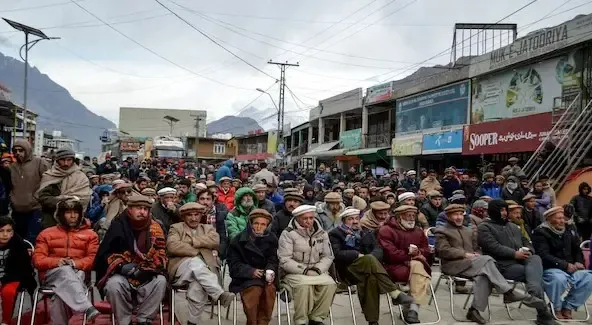Demonstrations Against Power Outages Disrupt Pakistan's Trade Link with China

Islamabad, Jan 8 (NationPress) Pakistan's vital trade connection with China has been obstructed for the fifth consecutive day on Tuesday as thousands continued to demonstrate against chronic and prolonged power outages in the mountainous region of Pakistan-Occupied Gilgit-Baltistan, according to media reports.
The leaders of the sit-in protest in Hunza, a scenic city with a population exceeding 70,000 in Gilgit Baltistan, have pledged to persist with their demonstrations until their demands are addressed.
Protest leaders highlighted the town's ongoing inadequate power supply, pointing out that residents are facing electricity outages lasting up to 23 hours during the harsh winter season.
Both men and women participated in the demonstration, enduring average daytime temperatures of -4 degrees Celsius and nighttime temperatures of -10 degrees Celsius, as relay participants informed a media outlet via phone.
Rahim Aman, a local resident of Hunza, noted a steady and significant rise in the number of protesters, mentioning that female activists were seen using vehicles and loudspeakers to boost attendance at the rally.
Representatives from local political parties, traders, and hotel associations were also present at the protest.
Despite negotiations with local authorities, the protesters remained steadfast, refusing to disperse and restore traffic along the Karakoram Highway, which connects Pakistan to China.
Hunza is located on the picturesque roadway that runs through the Gilgit-Baltistan region, bordering China's western Xinjiang province.
Traders reported that numerous containers filled with commercial goods have been stranded on either side of the highway due to the ongoing sit-in.
This debilitating protest began more than a month after Pakistan and China announced the year-round operation of their sole land port, the Khunjerab Pass, to enhance trade connectivity between the two nations.
The Khunjerab Pass, recognized as the world's highest paved border crossing, is situated nearly 190 km from Hunza and stands at an elevation exceeding 4,600 meters, previously closed for four months each year due to heavy snowfall.
The impoverished Gilgit-Baltistan region is heavily dependent on hydropower, but electricity generation nearly halts during winter due to the freezing of rivers and lakes. As a result, residents and businesses, including hotels, are compelled to utilize costly thermal generators to maintain power supply.
Residents and local experts have pointed out that the increasing reliance on such generators by major hotels and other commercial enterprises is harming the environment in Hunza and nearby areas.
The United Nations has reported that the Pakistani regions are home to some of the largest glacier fields outside the northern pole and are already facing the escalating threat of global warming.
The Khunjerab Pass is a crucial component of the China-Pakistan Economic Corridor (CPEC), a multi-billion-dollar initiative aimed at developing a comprehensive trade and transit infrastructure between the two nations, which are the most populous and the fifth-most populous in the world.
Since the launch of CPEC a decade ago, Beijing has invested over $25 billion in Pakistan and is keen to utilize Gwadar, a strategically managed Chinese port on the Arabian Sea, as a gateway to international markets.










